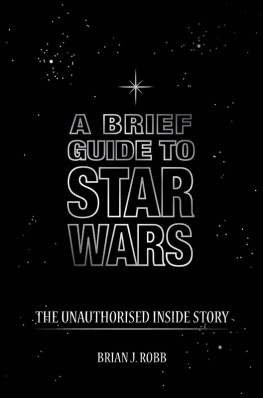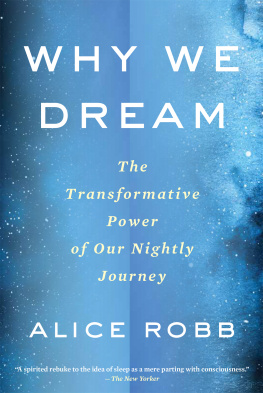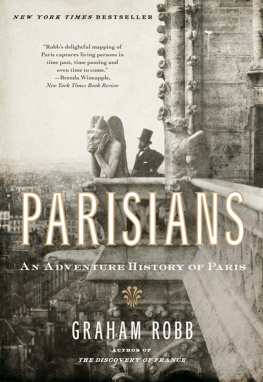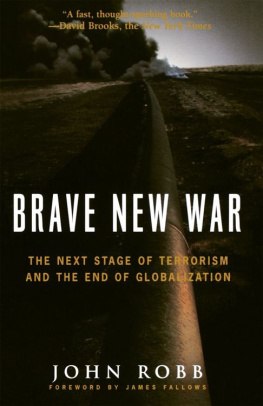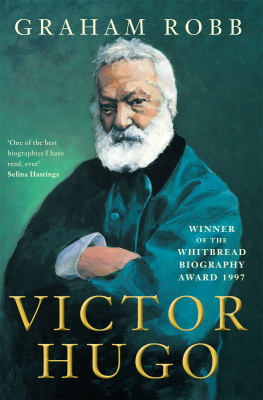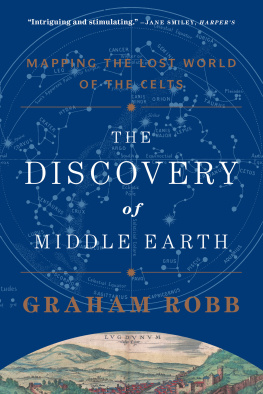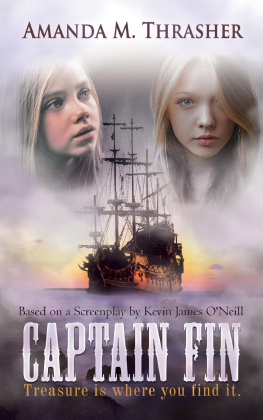Brian J. Robb is a writer and biographer whose previous books have included a New York Times and Sunday Times best-selling biography of Titanic star Leonardo DiCaprio; Screams & Nightmares, the definitive book on horror director Wes Craven; Counterfeit Worlds, exploring the life and work of Philip K. Dick; and a series of acclaimed film star biographies. For over ten years he was the managing editor of The Official Star Trek Magazine.
Recent titles in the series
A Brief Guide to Star Trek
Brian J. Robb
A Brief Guide to Secret Religions
David Barrett
A Brief History of Bad Medicine
Robert Youngson
A Brief History of Angels and Demons
Sarah Bartlett
A Brief History of the English Reformation
Derek Wilson
A Brief History of Roman Britain
Joan P. Alcock
A Brief History of the Private Life of Elizabeth II
Michael Paterson
A Brief History of France
Cecil Jenkins
A Brief History of Slavery
Jeremy Black
A Brief History of Sherlock Holmes
Nigel Cawthorne
A Brief History of King Arthur
Mike Ashley
A Brief History of the Universe
J. P. McEvoy

Constable & Robinson Ltd
55-56 Russell Square
London WC1B 4HP
www.constablerobinson.com
First published in the UK by Robinson,
an imprint of Constable & Robinson Ltd., 2012
Copyright Brian J. Robb 2012
The right of Brian J. Robb to be identified as the author of this
work has been asserted by him in accordance with the
Copyright, Designs and Patents Act 1988.
All rights reserved. This book is sold subject to the condition that it shall not, by way of trade or otherwise, be lent, re-sold, hired out or otherwise circulated in any form of binding or cover other than that in which it is published and without a similar condition including this condition being imposed on the subsequent purchaser.
A copy of the British Library Cataloguing in Publication data is available from the British Library.
ISBN 978-1-78033-399-1(paperback)
ISBN 978-1-78033-583-4 (ebook)
1 3 5 7 9 10 8 6 4 2
First published in the United States in 2012 by Running Press Book Publishers, a member of the Perseus Books Group.
All rights reserved under the Pan-American and International Copyright Conventions.
This book may not be reproduced in whole or in part, in any form or by any means, electronic or mechanical, including photocopying, recording, or by any information storage and retrieval system now known or hereafter invented, without written permission from the publisher.
Books published by Running Press are available at special discounts for bulk purchases in the United States by corporations, institutions, and other organizations. For more information, please contact the Special Markets Department at the Perseus Books Group, 2300 Chestnut Street, Suite 200, Philadelphia, PA 19103, or call (800) 810-4145, ext. 5000, or email special.markets@perseusbooks.com.
US ISBN 978-0-7624-4627-8
US Library of Congress Control Number: 2011942357
9 8 7 6 5 4 3 2 1
Digit on the right indicates the number of this printing
Running Press Book Publishers
2300 Chestnut Street
Philadelphia, PA 19103-4371
Visit us on the web!
www.runningpress.com
THIS BOOK HAS NOT BEEN AUTHORISED, PREPARED, APPROVED, LICENSED, OR ENDORSED BY THE J.R.R. TOLKIEN ESTATE LTD, OR BY ANY OF THE PUBLISHING COMPANIES ASSOCIATED WITH THE LITERARY WORKS WRITTEN BY J.R.R. TOLKIEN.
For Cameron, my very own space cadet...
Contents
Chapter 1
A Long Time Ago...
When I decided I wanted to be a filmmaker, all my friends thought I was crazy. Nobody went into film; the girls all gave a wide berth to film students because they were supposed to be weird.
George Lucas
George Lucas was born into a time of rebellion. The post-war years through to the 1960s saw many social conventions challenged and overthrown, as society and its tastes changed. For most of his teenage years in the late 1950s, Lucas was himself a rebel. This rebellious, anti-authoritarian streak continued as he entered professional filmmaking in the late 1960s, refusing to make movies in the style of the dying studio system, but instead adopting his own approach. However, with the unimaginable success of Star Wars in 1977 and all that came after it George Lucas became a rebel who built an empire. He became the very personification of the establishment he had set out to fight against. This is the story of how it all happened.
As a ten-year-old growing up in Modesto, California, the biggest thing in the life of young George Lucas was television. After several years of resisting, his father had finally purchased a set for the family. It opened up a window on a whole new world for George Jr as he no longer had to visit friends houses to see what was on TV. His favourite show quickly became Adventure Theater, screened nightly on San Franciscos Channel 4 KRON-TV. The programme was a compilation of old movie serials from two decades before, including the black-and-white adventures of Tailspin Tommy, Lash La Rue and Spy Smasher: It was a twenty-minute serial chapter, and the left over minutes of the half hour were filled with [the cartoon] Crusader Rabbit. I loved it.
There was one serial hero in particular that caught Lucass imagination. I used to love the Flash Gordon serials, Lucas recalled in later years. They were a profound influence on me. The way I see things, the way I interpret things, is influenced by television. Visual conception, fast pace, quick cuts. I cant help it. Im a product of the television age.
Buster Crabbe had played Alex Raymonds space-faring hero in three chapter-play movie serials made between 1936 and 1940. The character started life in newspaper comic strips in January 1934, following the adventures of polo player Flash Gordon after he and friend Dale Arden are kidnapped by scientist Dr Hans Zarkov. They journey to the planet Mongo, where the evil Emperor Ming attacks Earth with flaming meteorites. The popular strip was rapidly adapted into a movie serial by Universal Studios, spanning thirteen cliff-hanging instalments.
It would be twenty years after they were made before Lucas saw these three serials on television, but they were to have a profound effect on his creativity as a filmmaker and on his future. At the time, the adventures of Flash Gordon were an escape into adventure for a young boy who felt his everyday life was very dull indeed.
As suggested by its name, Modesto in northern California is a very modest town. The town might have been geographically close to San Francisco, but in terms of atmosphere and feel, Modesto was more like a Midwestern American town than one near either of the more socially progressive coasts. Modesto had a long history of nothing much happening at all. The flat landscape was dotted with farms, where every vehicle was worked hard. It was a town where ambitions were neither born nor fulfilled, where little of note ever happened.
It was here that George Lucas Sr ran L. M. Morris, a stationery store. The son of a Californian oilfield worker, Lucas Sr had come from a family that had never seen wealth. However, after years of working there, hed managed to buy the stationery store from its founder and was determined to make a success of it. As a young man he had lived through the Great Depression of the early 1930s, and he was determined that his own family would not suffer in the same way or want for anything.
Next page
